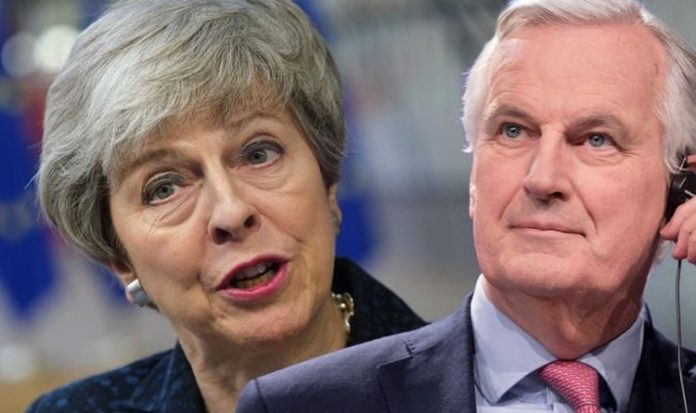The UK and EU have resumed face-to-face Brexit trade talks in London this weekend, as the deadline to strike a deal moves closer. The transition period is coming to an end in just over a month, but the EU’s chief Brexit negotiator Michel Barnier claimed that talks would need to be done with “patience and communication” if both sides are able to land a deal. Negotiations were halted last week after a member of the EU’s team tested positive for coronavirus.
Tweeting on Friday, Mr Barnier said that the “same significant divergences persist” between the UK and the EU.
Both sides have been in deadlock for months over issues such as fishing rights, governance of the agreement, and the so-called “level playing field”.
As Prime Minister Boris Johnson continues to insist that Britain is ready to leave the bloc without an agreement, John Longworth, the Director of the Centre for Brexit Policy has revealed why he thinks the Government is currently trapped.
He wrote in a recent report: “It is down to that failure to focus on the economy, however, that many of our current troubles lie, as it allowed the Remain-orientated, damage-limitation May administration, combined with an out-and-out Remain Parliament to negotiate us into a very disadvantageous place.

Brexit fury: Theresa May negotiated Britain into ‘disadvantageous’ place (Image: GETTY)

The EU’s chief Brexit negotiator Michel Barnier (Image: GETTY)
“It was a negotiation which was against our own national interests, conducted as if we should be forced to suffer for the heresy of denying the EU religion.
“The result is that the Government is now on a sticky wicket, trapped between the necessity of repudiating the previously ratified withdrawal agreement and seeking a deal which would seriously impact our ability to make the best of our new found economic freedoms. Even Boris’ ‘Australia-style deal’ (WTO terms of trade, plus administrative mini-deals) would end up with us looking less like what an Antipodean economic success and more like a version of its origins, a penal colony of the EU.”
For those who dismiss ‘Aussie rules’, Mr Longworth argued, it is worth reflecting that for most of the last 150 years Australia has had one of the highest GDP-per-capita ratios and growth rates in the world, outstripping its colonial motherland very early in its history.
Another interesting statistic is that only 13 percent of the UK economy and eight percent of businesses are involved with EU trade, the remainder being either purely domestic operators or trading instead with the rest of the world.
He added: “Any deal needs to be primarily favourable to these firms, rather than the EU and also to our predominant service sector, for which there remains no single market in the EU to speak of. The EU was after all, designed to suit German manufactures and French agriculture.
JUST IN: Merkel’s protégé ‘directly attacks Macron with foreign policy snub’

Prime Minister Boris Johnson (Image: GETTY)

EU-UK trade talks (Image: GETTY)
“The withdrawal agreement places important limits on us, using the Northern Ireland Protocol as the tail to wag the UK dog, and the wide EU definition of ‘state aid’ to limit our tax, regional and investment policies.”
Mr Longworth concluded in his piece for Briefings for Britain: “The next few weeks will reveal to what extent the Conservative government has failed to deliver its Brexit manifesto commitments, to what degree exiting the transition period means an unsatisfactory outcome or a reasonable compromise.
“Either way, it is certainly unlikely to be an ‘Australia deal’. Whatever the outcome, I fear the Brexit story will not have reached a conclusion.”
According to newspaper columnist Rod Liddle, not only former Prime Minister Theresa May negotiated Britain into a disadvantageous place but she also failed to deliver Brexit because her ministers ended up “showing her hand”.
DON’T MISS:
Nicola Sturgeon confessed Scotland’s EU membership ‘may be phased’ [REVEALED]
Boris Johnson said UK ‘could stay in single market for TWO years’ [INSIGHT]
Douglas Hurd turned Britons into EU citizens ‘WITHOUT reading what it [EXCLUSIVE]

Former Prime Minister Theresa May (Image: GETTY)
In his 2019 book “The Great Betrayal”, Mr Liddle said: “Theresa May’s most crucial bargaining chip – we will leave with no deal – was rendered impotent by the actions of members of her own Cabinet and especially the Chancellor of the Exchequer.
“The correct approach to negotiations would’ve been to explain to Barnier et al at the outset: ‘’We are leaving the EU.’
“’We are perfectly happy to do so with no deal other than a WTO deal, and pay you nothing whatsoever.’
“‘But you are our friends and allies and we would like to be helpful…’ “
However, Mr Liddle noted that Mrs May could scarcely use the threat of no deal – which would be gravely injurious to countries within the EU – because the threat was palpably false.
He explained: “At various stages, over the course of 18 months, when May and her team left for negotiations, Philip Hammond, the Chancellor, would state either that there was no possibility of a no deal Brexit, or that a no deal Brexit would mean planes won’t be able to take off or that the economy would be ruined.
“Fellow front-bench Remainers echoed these remarks and added a few of their own.
“Seen from the EU perspective, this made it clear that ‘no deal’ was a paper tiger.
“It should have been the starting point from which negotiations proceeded and of course, Hammond should have been sacked.
“In short, May’s strongest weapon was effectively taken away from her.”
Mr Hammond resigned as Chancellor hours before Mr Johnson became Prime Minister in July.







